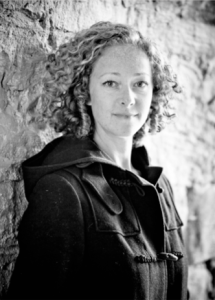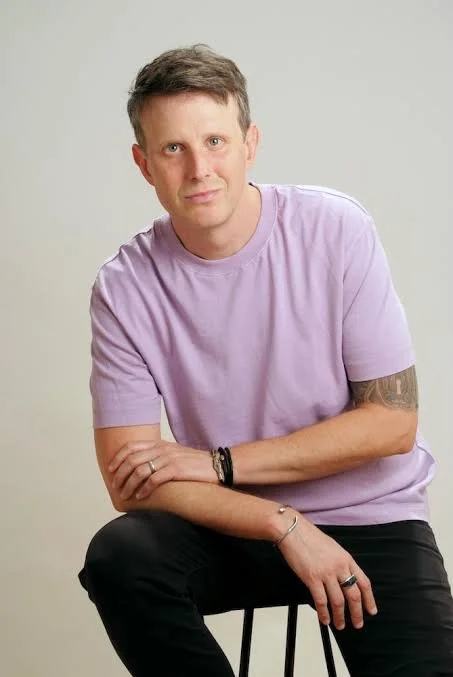
An interview with Ramona Ausubel, author of No One is Here Except All of Us and A Guide to Being Born.
Interview by Alex McElroy
Q: First off, what is a normal day of writing like for you? Do you have certain habits? Superstitions? Are you able to write every day?
A: I usually write four days a week when my son is in school. Depending on what stage of writing I’m in (new material or revision, novel or stories) I try to write for most of the day, leaving a little time for whatever else needs to be completed. Otherwise I try not to have too many special needs so that the little things don’t trip me up.
Q: Has the recent success of your first two books affected how you write? Do you feel you must hold yourself to a higher standard? And, on the most basic level, has your success affected your working habits?
A: I worried about having to go back to the blank page after having books published because I thought that the big Audience would follow me and make it harder to write. It turned out to be a lot less different than it had been before the books—I was just me in my own head with my own expectations and hopes. Books take such a long time to write that any concept I might have had of an audience quickly, happily, dissipated.
Q: Reading No One is Here Except All of Us and A Guide to Being Born, I was struck by your depictions of sex in its various forms, ranging from the heinous and disappointing (No One is Here … and “Atria”) to the absurd, in “Snow Remote,” and even the grotesquely comic—love causing physical deformities in “Tributaries.” Sex in your work is refreshingly unsentimental. And compared to other forms of human connection—storytelling or friendship—sex feels unlikely to bring people together emotionally. Could you say a little about this topic? Are you conscious of how you’re writing these scenes (avoiding sentimentalism, including the strangeness of sex) as you’re writing them, or is it something that emerges naturally as you create your worlds and characters?
A: Maybe it’s that I think we use sex as shorthand for love or connection, which of course it very often is. But it also expresses a lot of other ways of relating (the awkward, the violent, the dishonest, the ridiculous, the hopeful) and I wanted to get at some of those. I’m always thinking about how emotional lives can be represented in the body so this makes sex an obvious arena. I also just think that we’re physically a lot more absurd than we’d like to believe! Characters on my pages are often stuck between the idea they’ve been sold about sex—the two beautiful, perfect bodies convening in a love that will never die, the pillow grabbing climax, etc.—and the reality.
Q: You’ve drawn favorable comparisons to writers such as Gabriel Garcia Marquez, Aimee Bender, Miranda July, and others known for magical elements. The Boston Globe aligned with the “writers who show us the world as it is not, [writers who drop] surreal events and inflections into otherwise believable settings.” How do you feel about these comparisons? Do you ever feel limited by this particular aesthetic? Embrace it?
A: When thinking of things as they are not feels like it creates energy in my work, I embrace it. When thinking of the world as it is does the same electric thing, then that’s where I go. I try to allow myself as much territory as I need or want—hyper-real, fabulist, etc. Then a lot of my work takes place in the very muddy land of the human brain where what is true and what is perceived can be almost impossible to separate. I never get tired of exploring that and it affords me lots of fun and interesting matter to play with. We’re all at least a little bit crazy, right? And then you combine two or more people’s craziness together and things become exponentially more bizarre, and then you add the world/society/a particular city and a situation. That’ll keep me busy writing for many years!
Q: Somewhat of a follow up question. That style of writing—magical, fabulist, fantastical—seems to have grown in popularity over the last few decades, especially in American Literature, favored not only by major American writers, Karen Russell for instance, but many younger writers as well. What do you think contributes to the popularity of this style of writing? Both for writers, and for readers?
A: It does seem to be a zeitgeist. Maybe it has to do with the times in which we live, as our selves are refracted into digital versions that sometimes begin to feel more powerful than the “real” versions. Maybe this causes a need to think about deformation and perversion. I also think there’s an instinct to take literature back from something that’s “important” or somehow “good for you” and reclaiming the pleasure. The existence of Dave Eggers’ Best American Non-Required Reading series speaks to that. Most of the writers I love are not trying to best each other with literary impressiveness, but sloshing around in language and ideas because it truly matters to them to find ways of expressing these things. The borders come down pretty quickly and new terrain is explored. I love that.
Q: In its review of A Guide to Being Born, The Daily Beast wrote that “clearly [Ausubel] understands that in order to make this kind of story work, the oddness must serve a metaphorical purpose beyond merely standing out, and the familiar elements must be convincingly rendered.” Do you agree with that statement? Must the oddness serve a metaphorical purpose? And what is gained through the use of metaphorical—or oddness as it speaks to real-life—rather than literal or realist storytelling techniques?
A: I definitely agree with that. It doesn’t matter what kind of story we’re looking at: every aspect must be playing as part of the larger orchestra. It has to move toward something. Mean something. Readers sniff out falseness really fast. A writer may start with a conceit but it certainly needs to grow out beyond just a clever set-up if it’s going to be a real story.
Q: Your work also seems very interested in death, both in how the dead spend their days, and in the ways in which the living interact with the dead or attempt to grieve. Yet your fiction hardly feels heavy or morbid, as one might expect. How are you able to avoid the stifling weight of your subject matter?
A: I’m glad it doesn’t feel morbid! That might be part of my interest in the subject—death is part of every single person’s life. A) we’re all going to die and B) each of us has alive people and dead people that continue to matter. It’s often tragic or sad and probably the biggest mystery that no one will ever solve (what does happen??) but it’s also utterly normal and regular. Somewhere in that unknownness we’re all cooking up stories to make it OK or survivable or even sometimes beautiful. We tell the story a certain way, we light the candles to the particular saint, we send prayers up, we try to forget, we try to remember. It’s so human, all of it, and tender and unique and fumbling.
Q: More generally, what draws you to writing about death? Is it a personal compulsion, or might death—forgive the leading question—be an obsession shared by a broad range of writers?
A: I guess it’s the unanswerableness that keeps me coming back. Because each character in each situation invents an entirely new version of what death is and what it means and because the version cannot be proven or disproven, that invention becomes true. Grief and loss takes on a presence in people’s lives that no one else can dismantle or deny. The ghosts are truly everywhere.
Q: Finally, you stated that you liked “the tension between the unique experience of an individual and the pull of group-think. These won’t be the last stories about groups that you’ll see from me.” Have you lived up to that promise? Are you working on anything now that focuses on the tension between the individual and the group?
A: On a smaller scale, yes. My new novel includes a group of children whose parents have disappeared. The kids take up residence in the backyard in a tipi and attempt to live like their misguided idea of Indians. No individual could child could have mustered the belief in their situation were it not for the others. I’ve also been working on a story about a young couple in which the woman, believing she is going to die, cooks up a truly terrible plan to stay with her beloved forever by transplanting their hands, and in the isolation chamber of their relationship, her boyfriend gets swept up in the idea.
And who knows what’s next—certainly not me!
------------------------------------------------------------------------------------
Ramona Ausubel grew up in Santa Fe, New Mexico. She is the author of the novel No One is Here Except All of Us, published byRiverhead Books in 2012, and a collection of short stories A Guide to Being Born (2013). Winner of the PEN Center USA Literary Award for Fiction and the VCU Cabell First Novelist Award, she has also been a finalist for the New York Public Library Young Lions Fiction Award, and long-listed for theFrank O’Connor International Story Award and the International Impac Dublin Literary Award. She holds an MFA from the University of California, Irvine where she won the Glenn Schaeffer Award in Fiction and served as editor of Faultline Journal of Art & Literature.
Her work has appeared in The New Yorker, One Story, Electric Literature, FiveChapters, the Green Mountains Review, Slice and elsewhere and collected in The Best American Fantasy and online in The Paris Review. Her work was included in a list of “100 Other Distinguished Stories of 2008″ in the Best American Short Stories and thrice as a “Notable” story in the Best American Non-Required Reading. She has been a finalist for the Puschart Prize and a Fellow at the Bread Loaf Writers’ Conference and the Sewanee Writers’ Conference.
Ramona has taught and lectured at the University of California, Irvine, the Bread Loaf Writers’ Conference, Pitzer College and the University of California, Santa Barbara and served as a mentor for the PEN Center USA Emerging Voices program. She is a faculty member of the Low-Residency MFA program at the Institute of American Indian Arts.
She is at work on a new novel and a new collection of stories.
About the interviewer:
Alex McElroy lives in Arizona. His work has appeared or is forthcoming in Black Warrior Review, Indiana Review, Gulf Coast, Music & Literature, The Millions, Passages North, The Chattahoochee Review, Tin House, The Offing, and more work can be found at alexmcelroy.org.





























































